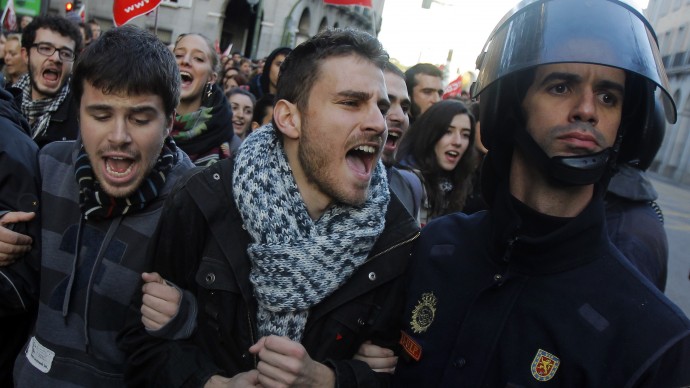
(MintPress) – Throughout Europe, millions of protesters joined a strike as a coordinated day of action was called against the austerity measures that were proposed by governments throughout the struggling eurozone. Violent protests, disruption of public transportation and the closure of many schools, shops and factories mark this burst of anger that has swept through Portugal, Greece and Italy — and to a lesser degree — France, Belgium and Germany. Decreased government spending and increased taxes are being blamed for sweeping unemployment and a compromised standard of living.
The European Trade Union Confederation (ETUC) called for day of solidarity. As stated on its website, “The ETUC strongly opposes the austerity measures which are plunging Europe into economic stagnation, recession, and dismantling the European social model. These measures, far from restoring confidence, are only aggravating imbalances and creating injustices.”
The confederation, in its declaration for a day of action and solidarity, states that it “… consider(s) that the recession can only be stopped if budgetary constraints are loosened and imbalances eliminated, with a view to achieving sustainable economic growth, and social cohesion, and respecting the values enshrined in the Charter of Fundamental Rights.”
Austerity, or the systematic cutting of governmental expenditures by eliminating or downgrading social programs while increasing the tax rate, has been blamed for aggravating the livelihood of many in the eurozone who were already affected by the American housing bubble collapse or the debt crises in Spain and Greece.
For 2011, the unemployment rate in Ireland was 14.4 percent, in Greece 17.7 percent, 12.9 percent in Portugal and an astounding 21.7 percent in Spain. In comparison, the U.S. had an unemployment rate of 8.9 percent at the same time.
Since the collapse of the Spanish housing boom five years ago, more than 400,000 homes have been foreclosed upon throughout the country. More than €600 billion of mortgages were let go at a default rate of 3.1 percent, lower than the 10.5 percent average for all lending, according to the Bank of Spain. The Spanish government is currently in negotiations to block future foreclosures.
Violent clashes between the police and frustrated protesters has led to Amnesty International issuing a public reprimand and warning. Reports of excessive use of force against protesters and journalists, obstruction from medical assistance and police detention without charge has led the group to call for international action to address and remedy these human rights violations.
While Greece is pushing through a budget with even tighter austeric controls, and Germany is pushing for strengthened caps of borrowing throughout the eurozone, most experts believe that economic stability may still be a long-term goal for Europe.
The toll of the people
In a Sept. 28 report by the Guardian, Lisha Yan, a 26-year-old London media executive stationed in Madrid, reports of her experience with police responding to a suspected riot: “We were walking to our taxis and all of a sudden people were running towards us and these big vans appeared … We heard loud shots. Then I felt something hit my knee and I realised that it was police firing rubber bullets at civilians in a public place … The police didn’t care who they shot at. It was just outrageous.”
Police were chasing demonstrators who were protesting outside of parliament office buildings that week, but the police action seemed to be indiscriminate — Yan was standing with a group of Asian executives at the time.
The realities of austerity is striking. In Spain, more than 500,000 households do not have an income earner. More that 25 percent of all adults are unemployed. More than 50 percent of work-seeking 25 years old-or-unders can’t find a job. Half of all immigrants are in the same situation. One-half of all individuals who are unemployed are currently ineligible for unemployment compensation. One in 25 of all senior citizens who are in private elderly care have been pulled out, either because their families cannot pay, or — more dauntingly — their pensions are needed to help shore up their families. Private charities, such as the Roman Catholic Church, has been pushed to the breaking point.
Not only is the health of the people falling, the cultural identity of the nation is deteriorating, as well. Public museums, such as Madrid’s El Prado, has seen budget cuts in excess of two-thirds. The caja banks, which have been an underwriter of Spain’s institutions for centuries, no longer exist. They have accepted the banking industry’s lending freezes. Catalonia, frustrated with the austerity measures, is moving toward secession.
One in 11 Athenians uses soup kitchens and bread lines. Throughout Greece, more than half of the most prescribed medications are now in short supply. The take-home pay for the average Greek worker has dropped 30 percent since the crisis began. Recently, the Greek government has called for a 22 percent cut to the minimum wage, and in most parts of the country, violent crime has exploded.
The suicide rates in Ireland, Italy and Greece are on the rise, according to the New York Times, with a 52 percent increase in suicides motivated by economic difficulties between 2005 and 2010. Moves by governments to not pay off debts to struggling businesses in an attempt to balance budgets and cuts to critical care and compensation programs have increased the hopelessness the people feel.
How did Europe get into this mess?
The eurozone, or the European Central Bank’s zone of influence, was created in 1998 to leverage the economic strength of the European Union against the American dollar on equal terms. It was felt that by uniting under a single currency, the euro, European economies would mutually support each other, promoting trade within the European Union and serving as a hedge against trade imbalances from outside.
It didn’t work out that way.
The headaches began Oct. 19, 2009 when Greece’s newly elected socialist government revealed that there was a “black hole” in Greece’s financial records. In an attempt to meet the convergence requirements for eurozone membership, Greece “fudged” its borrowing statistics to acceptable limits. Prime Minister George Papandreou’s announcement that the nation’s deficit will actually be double previous government projections — and will, in fact, reach 12 percent of Greece’s gross domestic product — dropped the FTSE 100 200 points. The problem compounded when Standard & Poor (S&P), Moody’s and Fitch downgraded Greece’s credit rating from A- to BBB+ and declared Greece’s debt junk.
In light of this, Papandreou introduced the first suite of disastrous austerity cuts, intended to “… address and resolve, once and for all, deep-rooted problems that are holding the nation back.” The resulting fiscal chaos in Greece dragged the value of the euro down and showed cracks in the foundation of the United Kingdom’s and and Spain’s financial foundation. Failed attempts in 2010 to bail out Greece exposed more cracks. Credit default swaps and a March 2010 bond sale forced an even more severe set of austerity checks March 3, 2010. According to Papandreou, these draconian measures were needed for Greece’s “survival and economy.”
Despite a bailout agreement with eurozone nations and the International Monetary Fund, S&P still declared Greek credit junk April 27, 2010, derailing a market rebound for Greece. The feedback of this finally shook loose the financial ceilings of Portugal and Spain and sent instability-warning shockwaves through the rest of the eurozone. Fitch downgraded Spain in response of austerity cuts May 28, 2010.
In July 2010, Hungary asked the EU and the IMF for an “precautionary bailout” to shore up and protect Hungary’s economy in light of a potential financial collapse in Europe. In the same month, Ireland’s credit was downgraded.
Ireland, as a result, entered a double-dip recession in September of 2010. The national output dropped by 1.2 percent in the second quarter of the year. Later that month, Ireland nationalize Allied Irish, the fourth bank to be brought under national control and the second-largest bank in the country. Spain was downgraded around the same time, and massive rallies started to explode throughout Europe (previously, they were limited to the Iberian Peninsula and Greece).
In November 2010, the IMF and the EU bailed out Ireland as the Irish government instituted a heavy set of austerity measures. Like Greece and Spain, the austerity measures exaggerated the social price of the budget cutting, with unemployment spiking and aid to the poor being limited.
In June 2011, after a confidence vote, Papandreou accepted a €120 billion bailout from the European Union, while the next month, Portugal’s bond rating hit junk status, and in August, the United States — the fiscal backer for much of Europe’s security market — was downgraded, decreasing the value of the dollar. Short-term holding and trading of stocks, known as short-selling or speculating, also threatened the stability of European markets, leading to a ban on the practice by France, Italy, Spain and Belgium.
And so on …
This cycle of austerity measures, bailouts and more austerity measures is creating what economist John Maynard Keynes call the paradox of thrift, which basically say if you save money in time of a recession, you are not spending money, which drives down demand. This depresses consumption and economic growth, causing you to save less money than if you didn’t save money at all. Ultimately, the austerity measures decrease employment in the region, which weakens the tax base, which decreases the state’s revenues. This causes a deficit, which must be met in order to avoid dragging the entire eurozone down into oblivion. So, a bailout is drafted, more austerity measures are drawn to pay the interest, and the cycle repeats.
The true irony of austerity is that it is being carried out by nations ill-equipped to handle it.
Greece, for example, has 40 percent of its GDP coming from the public sector — that is government jobs, entitlements and governmental contracts. As austerity mandates an outside creditor-first attitude, 40 percent of the GDP is strangled. This causes a decrease in tax revenue, a freeze on lending and outrageous inflation. This also causes the closure of businesses that cannot function in the new economic model, and a hiring freeze for those that can. On top of this, Greece’s economic reality is completely warped. Tourism is Greece’s chief industry, and that took a hit since the riots began. More damningly, the Greek tax system is so convoluted that fraud and outright avoidance is rampant. Honest reform from the bottom-up with Greece’s economic system may be the only way to correct this vicious cycle.
Spain, Portugal, Italy, Ireland and most of the minor members of the eurozone find themselves in similar situations. It is an accepted fact that the eurozone would have collapsed if it wasn’t for the buffer Germany offers. Recently, Germany has suggested the ratification of stricter rules that hold eurozone members to “structural” borrowing of just 0.5 percent of their national output, and a total borrowing of 3 percent of the output. This is designed to avoid the accumulation of too much debt. The problem arises when you consider that this was already proposed and implemented in 1997, and Italy, Germany and France turned out to be the worst offenders of this limit. In fact, only Spain faithfully upheld the agreement.
The problem is apparent when you look at Spain’s debt profile. In 2000, Spain had 187 percent of its national output in private debt. This jumped to a whopping 283 percent in 2010, compared to a steady held 72 percent of governmental debt. This is compared to 164 percent private debt and 77 percent governmental debt for Germany in 2010. This led to a debt-filled bubble that buoyed the economy with low interest rates in Southern Europe when the eurozone started that since popped. This created a trading surplus for Germany and a trading deficit for Southern Europe with rising labor costs.
This leads to the million-dollar question: Can the eurozone survive? A better question may be “Should it survive?”


